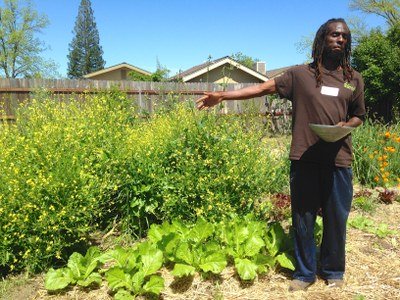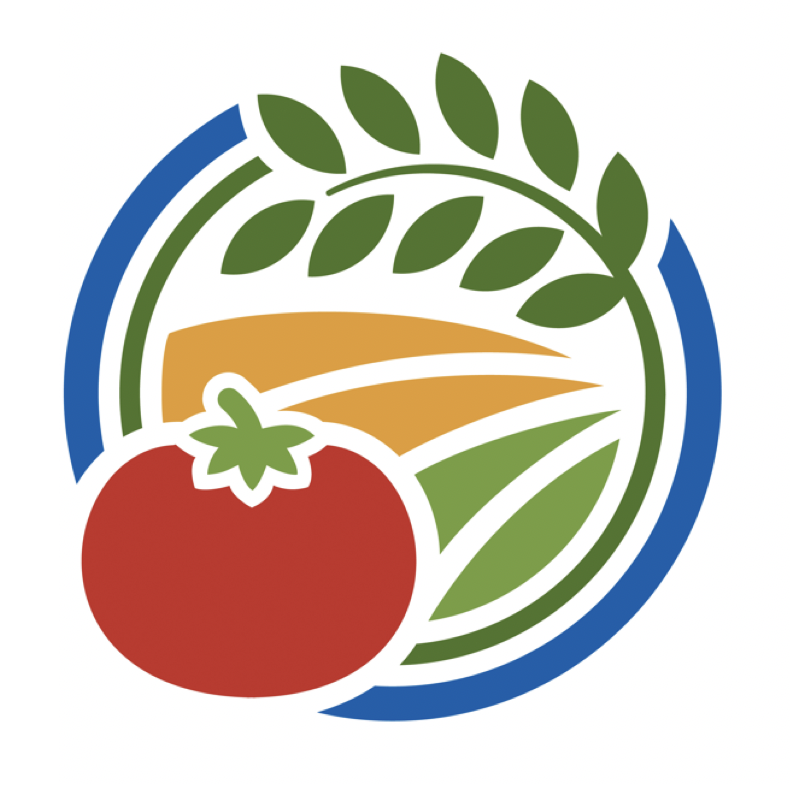Yisrael Family Urban Farm partners with UC ANR to teach urban agriculture skills

Chanowk Yisrael of the Yisrael Family Urban Farm in Sacramento presents at an urban agriculture workshop.
Following Chanowk, UC Cooperative Extension Integrated Pest Management Advisor Cheryl Wilen led a walk around the small farm, discussing pest identification methods and trap cropping in vegetable production as a method for managing pests. Chanowk and Cheryl were two of the expert trainers at the low-cost “Production Issues for Urban Farmers” workshop offered for urban farmers in the Sacramento region on April 14, 2018. Other speakers discussed design and planning, irrigation, improving soil quality, and pollinators on urban farms.
In Sacramento, as in cities all over California, new farmers are transforming empty lots and backyards into working farms, growing fruits and vegetables to sell or distribute locally. Urban farms are often very small scale, commercially marginal, and operated by beginning farmers. They can be operated by individuals, families, non-profit organizations, schools or colleges, or by other groups. Research shows that successful urban farms can bring social, health, environmental, and economic benefits to local communities, including improved access to healthful food. A number of cities in California, including San Francisco, Los Angeles, Sacramento, and San Diego have recently updated municipal policies to facilitate urban agriculture, due to strong community interest.
Despite the benefits associated with urban agriculture, there are many challenges. Urban farmers routinely face issues related to zoning, soil, water access, and profitability, as a few examples. A team of UC Cooperative Extension farm advisors, specialists and others, including UC SAREP, are working with local partners in four California urban regions, offering a series of workshops to help urban farmers address some of these challenges. The workshop at the Yisrael Farm was the third of a four workshop series held in Sacramento; similar workshop series have been offered in Los Angeles, the San Francisco Bay Area, and San Diego.
At the first Sacramento area workshop, "Marketing and Business Management for Urban Farms," Gail Feenstra and Penny Leff from UC SAREP led discussions on business planning, marketing channel selection, understanding accounting records, and financial planning tools. Neil Thapar from the Sustainable Economies Law Center explained labor and employment laws relating to small farms, Oak Park Farmers’ Market manager Joany Titherington talked with the group about what it takes to sell at her neighborhood certified farmers’ market, and a panel of local urban farmers shared their marketing strategies.
The second workshop covered the legal basics of urban farming, including types of urban farm enterprises, zoning issues, soil testing, and required permits and licenses. Participants were introduced to key local resources including the Agricultural Commissioner, the county Environmental Health Department and a leader from the Sacramento Food Policy Council, a local group involved in advocating for city and county policy changes allowing urban farm stands and tax incentives for landowners who lease land to urban farmers. The panel discussion at the “Legal Basics for Urban Farms” workshop gave everyone a chance to ask questions of all the speakers
The final Sacramento workshop covered pre- and post-harvest food safety practices, using CDFA’s Small Farm Food Safety Guidelines.
The series of urban agriculture workshops has, hopefully, helped build stronger collaborations among the regions’ urban farmers as well as between UC and the community organizations we worked with as partners. The UC ANR team will learn from the project participants’ evaluations and feedback, and will continue to work with local urban farmers and their organizations to support everyone growing and distributing food from California’s urban farms.
Presentations and handouts from the workshop series’ are available at ucanr.edu/sites/UrbanAg/Urban_Ag_Workshops/
For more UC urban farming resources, see: ucanr.edu/sites/UrbanAg/
